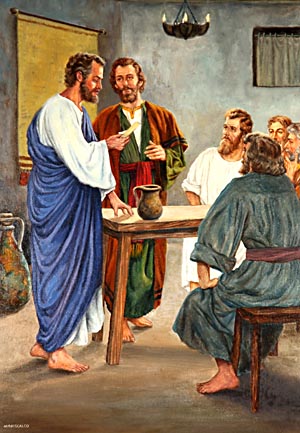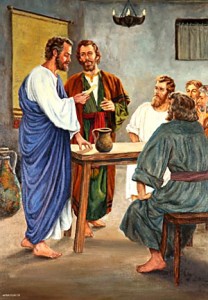Paul’s Missionary Journeys
Devotions on Acts 17:1-9
Monday–Paul’s Missionary Journeys
“After Paul and Silas had passed through Amphipolis and Apollonia” (Acts 17:1a).
Chelsea was REALLY involved in her congregation. She taught the third grade class of Sunday school students, chaperoned high school outings, chaired the Fiftieth Anniversary Committee, served on the Altar Guild and usually held a council position. Not only was Chelsea REALLY involved, she was also really tired. Her family thought she loved the church more than she loved them. Chelsea, though, had a problem saying, “No.” It was only through the intervention of a couple of her friends that Chelsea was able to shed some of her responsibilities and concentrate on only the one or two to which she truly felt called.
There were many towns and cities where Paul and Silas could have started congregations. They passed by most of these places including Amphipolis and Apollonia. They didn’t feel that the Holy Spirit was directing them to those towns. Instead they were drawn to Thessalonica.
As disciples of Jesus Christ we are members of a community called the Body of Christ. No one is called to everything. In fact no one is called to do a lot of things. We are all, though, called to do something. When we ask, the Holy Spirit will guide us and show us what ministries and activities of which the Spirit wants us to be a part. All the others are meant for someone else.
Precious Lord, we want to serve you. Help us sense the guidance of your Spirit so that we may use our talents and abilities where you want us to use them. Amen.
Tuesday,
“They came to Thessalonica where there was a synagogue of the Jews” (Acts 17:1b).
Paul began the practice of visiting the synagogue first, after his arrival in a new community. Paul was a Roman citizen, but his primary identity was that of a Jew. The synagogue was a place where Paul could be with people who had a common heritage, the same social and religious customs and similar world views. Paul could talk about Jesus and share his beliefs in a way that was understandable to his listeners. The other Jews in the synagogue might have been resistant to the idea that Jesus was the Messiah, but at least Paul was able to begin the conversation on common ground.
It may be a scary thought, because they know us so well, but our primary mission field consists of the people close to us. We are more aware of their needs than we are of mere acquaintances or strangers. The people close to us may be more open to our assistance as we seek to use our gifts and talents to minister to their needs. They are also probably more open to us sharing stories of our walk with Jesus. The people around us aren’t the limits of our ministry, but they are its beginning.
Lord, as your children and the Body of Christ, enable us to walk our talk and be open and loving to those around us. Amen.
Wednesday–Paul’s Missionary Journeys
“On three Sabbath days [Paul] argued with them from the scriptures” (Acts 17:2).
The presidential primaries are the topic of many conversations lately. Conversations are fueled by sound bites, Tweets and the latest personnel attacks. People are staunch supporters of one candidate and adamantly opposed to the others. Followers of opposing candidates can’t understand how the people on the other side think. When supporters of any candidate are asked what programs and policies their candidate espouse, however, they are at a loss for words. Few have gone beyond the sound bites and researched their candidates’ websites and position papers.
Neither Paul nor the people he met in the synagogue in Thessalonica were interested in personal opinions or interesting ideas. They understood the law and the prophets that made up the Hebrew Scriptures to be inspired and looked to them for guidance. Paul and the people discussed the different interpretations and made decisions based on what they believed were the correct understandings of the scripture.
Our walk of faith as disciples of Jesus Christ is guided by God’s Word and our belief that the Spirit speaks to us through the stories contained in the Bible. We study the scripture individually and in groups so that we may nurture our faith, deepen our understanding of God’s love and grace, and discern how we are being asked to respond to that love and grace.
Holy Spirit, speak to us and lead us along the path of love and service. Amen.
Thursday,
“Explaining it was necessary for the Messiah to suffer and to rise from the dead” (Acts 17:3).
Jesus didn’t come up with the idea that the Messiah had to suffer and die. The idea is found in the Hebrew Scriptures, especially the book of Isaiah. The idea of a suffering servant never was popular, though. It was much more exciting to think about a Messiah who would be powerful, who would overthrow corrupt governments and occupying armies and who would establish God’s kingdom as the most powerful political force on earth. That type of Messiah created excitement and attracted followers.
When reading the Bible we are sometimes afflicted with “selective seeing,” which is a malady that is quite similar to “selective listening.” With selective seeing we read only what we want to read and ignore the rest. We love to read, “I have come to give you life and give it to you abundantly” (John 10:10). Or, “If the Son makes you free you will be free indeed” (John 8:36). We occasionally skip over Jesus’ words when he says, “If anyone would come after me let him deny himself, take up his cross and follow me” (Matthew 16:24). There is no need to ignore or fear the passages of scripture that challenge us rather than comfort us. Jesus has promised to be with us no matter what we encounter.
Powerful Lord, open our eyes that we may see and our ears that we may hear. Then give us the courage to follow. Amen.
Friday–Paul’s Missionary Journeys
“Some of them were persuaded and joined Paul and Silas, as did a great many devout Greeks and not a few leading women” (Acts 17:4).
While cleaning a closet, Silas came across a picture of his confirmation class. The picture was almost sixty years old. He gazed at the faces in the picture. Once they were confirmed they had all gone their separate ways. A few had stayed active in the church while a couple of others had never set foot in a church again. One of the gals in the class had dropped out of church until she had a child and wanted to have the child baptized. Over the years she’s had three children baptized and served in just about every congregational office possible. Two of his classmates had church funerals. Silas looked at the picture and marveled at the way the Holy Spirit had moved in all of their lives and how they had responded to that touch.
John writes in his gospel that, “the Spirit blows where it wills” (3:8). In the original Greek John’s phrase is a pun. The word for “Spirit” can also be translated “breath” or “wind.” The wind blows and it cannot be contained or controlled. We have experienced this truth frequently in our lives. Some people are deeply moved by an act of kindness, while others merely utter a polite, “Thank you.” Hard times draw some people closer to God and other people farther away from God. Paul’s experience demonstrates this truth also. Some of the people in the synagogue believed while others rejected the good news Paul shared with them. There were outsiders, gentiles, who believed along with several prominent women. All had heard the same words from Paul but they responded differently.
Uncontrollable
We can’t control the Spirit and truth be told that’s not our job. We are simply to be God’s witnesses wherever we are and trust that the Spirit will use our words and actions to touch the lives of others and gift them with faith.
Blow, Spirit, blow breeze through [our lives] with your flow, stir up in [us] lives that are truly free. Amen. (From the song “Blow, Spirit, Blow”)
Saturday–Paul’s Missionary Journeys
“’These people who have been turning the world upside down have come here also’” (Acts 17:6).
What a compliment to those early Christians. Jesus certainly turned the world upside down—or better—“right-side-up.” His followers were doing the same as they proclaimed the gospel of Jesus Christ and shared God’s love and grace with the people with whom they came in contact. Of course, not everyone likes an upside down world. Jesus paid the ultimate price for turning the world right-side-up, the Romans executed him. In Thessalonica Paul and the other Christians faced the wrath of the crowd.
Today the church is not known for turning the world upside down. We know that the Holy Spirit hasn’t changed. The same spirit that raised Jesus from the dead and empowered the early Christians to turn the world right-side-up is in us. Perhaps we don’t accomplish great things because we fear the cost. Paul and the early Christians faced persecution boldly because they didn’t consider the cost. Their goal was faithful obedience. This is our goal, also.
Loving God, forgive us when we cringe at the price of following you. The cost was not too high for you and may it not be too high for us. Amen.
Sunday–Paul’s Missionary Journeys
“They are acting contrary to the decrees of the emperor” (17:7).
Most of us live in countries where we are free to worship as we want. We don’t need to worry about acting contrary to the decrees of the emperor. That’s not to say that we don’t march to the beat of a different drummer. While others seek their own comfort we care for the poor, sick and neglected. When some declare that it is their religious “right” to judge others and refuse to serve them, we stand on the side of the rejected and with them fight for justice. Some people may refuse to forgive, but we forgive the unforgiveable. There are people who contain their love. We love the unlovable.
We are contrarians. Our purpose is not to live to please the crowd or to act in an acceptable and pleasing manner. We are disciples of Jesus. As his followers we deny ourselves and take up our crosses. We shun the accolades of the world and seek only to hear the words, “Well done my good and faithful servant.”
Mighty God, grant us the ability to not be conformed to this world but rather to be transformed by your Holy Spirit so that we can be used by you to change the world in which we live. Amen.


